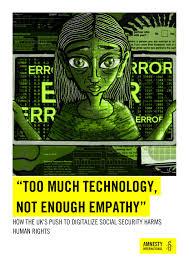
https://www.amnesty.org/en/latest/news/2025/07/uk-governments-unchecked-...
People with disabilities, those living in poverty or who have serious health conditions are being left in a bureaucratic limbo due to digital exclusion caused by the Department of Work and Pensions’ (DWP) unchecked roll-out of technologies, Amnesty International said today in a new report.
The report, “Too Much Technology, Not Enough Empathy” exposes how the DWP’s constant testing, rolling out, and rolling back of costly artificial intelligence (AI) and digital technologies for Universal Credit (UC), Personal Independence Payment (PIP), and other social security schemes has created an inaccessible social security system for people who are already marginalized and at risk of poverty in the UK.
Many people requiring social security do not have access to digital technologies, internet or internet connected devices. Their affordability coupled with language barriers and long waiting times for telephone services have led to digital exclusion from DWP’s systems.
“The DWP’s mission to reduce ‘costs’ is the beating heart of fascination with, and overreliance on, problematic tech. People are struggling to make ends meet and put food on the table due to cuts in social security and yet the DWP is more concerned about experimental technologies to surveil claimants,” said Imogen Richmond-Bishop, Researcher on Technology, Economic, Social and Cultural Rights.
“The tech-enabled system to claim and manage welfare benefits is resulting in relentless dehumanization and strain for people who are already wrestling to access their basic needs in a broken system.”
The research is an extension of Amnesty International’s 2025 report, “Social Insecurity: The devastating human rights impact of social security system failures in the UK”that details how the UK’s social security system requires a wholesale overhaul to put it back on track to being human rights compliant and ensure a decent standard of living. The struggles in accessing adequate social security payments to prevent poverty are intersectional and complex, with technology forming one component of the broader social support ecosystem.
The tech-enabled system to claim and manage welfare benefits is resulting in relentless dehumanization and strain for people who are already wrestling to access their basic needs in a broken system.
Imogen-Richmond Bishop, Researcher on Technology, Economic, Social and Cultural Rights
Both investigations draw their findings from questionnaires, focus group interviews with social security recipients and social security advisors, and build on previous work done by civil society. In total, views of 782 people were captured through this process that took place from October 2024 to January 2025.
Perfect storm of pre-existing flaws and new problems
The use of digital technologies combined with further cuts to the UK’s social security system after years of austerity has created a perfect storm, where pre-existing flaws are being exacerbated, and new problems linked to these new technologies are being created.
Automated systems and the use of AI in the assessment and provision of social security can introduce a significant risk of errors in decision making, due to biased or discriminatory algorithms, with serious consequences for claimants.
Digital exclusion can be experienced due to a person’s living conditions, educational attainment, health status, and income levels – complex factors that are not always fully captured by automated social security systems.
For one of the claimants interviewed by Amnesty International, gender, and socio-economic status all represented barriers to her access to services online.
“You know, have some form of compassion, you know, make the forms and things easier. I mean, I’m quite illiterate. I mean, a lot of women, and men of my age, can’t use them […] So they’re stuffed. They send me letters on my phone. I can’t open them. So I ring up. I can’t open it. I haven’t got an iPad. I can’t afford an iPad, you know,” the claimant told Amnesty International.
Human rights implications
The digitized and sweeping data collection has also created an all-seeing social security system that impacts claimants’ rights to privacy, data protection, and human dignity.
Using extensive amounts of data to determine eligibility for state support is not new. However, the scale and the breadth of the data used, and the speed with which it is processed now is new and can bring with it new unintended consequences and human rights risks.
“DWP’s experimentation with tech systems has jeopardised human rights and reduced people in need to data points. The success of a claim can be dependent on whether they neatly fit into a box or meet set criteria rather than their actual eligibility. Technology in this instance has oversimplified people’s complex realities and this demeans people’s needs especially when they are unable to get the support they need from a human case worker,” said Imogen Richmond-Bishop.
Amnesty International wrote to the DWP ahead of the publication of the report and provided a comprehensive summary of the research findings and the methodology. DWP declined to comment on the substance of the report at this time of publication.
The UK authorities must carry out an independent, and impartial review of the social security system as well as the digital systems used by the DWP and scrap any that violate human rights. We need laws to regulate AI to ensure it doesn’t contribute to human rights violations. Digital systems must be transparent, explainable, and never mandatory.
Background:
In May 2025, Amnesty International’s “Social Insecurity” report, exposed how cuts, sanctions and systemic failings of the UK’s social security system are pushing people deeper into poverty.
Amnesty International has also done research on public sector automation and digitalization in Denmark, Netherlands, India, Serbia, and supported work in France and Sweden on the resulting human rights risks and impacts of algorithmic decision-making in these jurisdictions.









